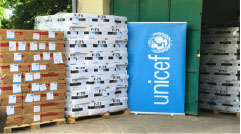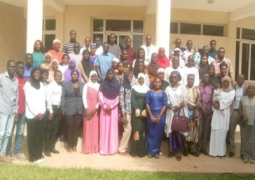
Funded by the Government of Japan through UNICEF, the supplies will support the treatment of more than 7000 children with severe acute malnutrition in the country.
The items include over 2000 cartons of Ready to Use Therapeutic Food, 500 boxes of F75 therapeutic milk, 50 mother/child weighing scales, 400,000 doses of Mebendazole and 450 cartons of Resomal.
“These provisions will be distributed across the country to support service continuity at both the health facility and community levels ensuring timely life saving management of children who without these supplies will not be able to survive,” said Gordon Jonathan Lewis, UNICEF Country Representative.
Severe acute malnutrition according to him; is the most severe form of malnutrition and affected children may require immediate medical attention to survive.
“More than 9000 children are expected to suffer from severe acute malnutrition in The Gambia in the coming year due to food insecurity, increased poverty levels and the consequences of Covid-19. As a result, The Gambia Integral Management of Acute Malnutrition programme is a crucial lifesaving component of basic health care services,” he noted.
He assured that UNICEF will continue to work with all partners including communities to not only provide nutrition supplies but also encourage healthy nutrition within the context of a strong food system in The Gambia.
Japanese Ambassador to Senegal and The Gambia, Arai Tatsuo, said the government of Japan allocated 340.200 US dollars to The Gambia through UNICEF to provide to targeted children and mothers with nutritious services.
The “lifesaving nutrition for the children in The Gambia” project according to him, aims at supporting the continuity of nutrition services critically by providing lifesaving nutrition supplies, treatment of childhood illness and reduction of vulnerability to the adverse impact of Covid-19 at the local, regional and national level.
He said the project also ensures capacity building of health workers and engage communities in treatment and disease prevention including covid-19 and childcare practices for resilience, pointing out that enhancing human security is a key pillar of Japan cooperation towards friendly countries as The Gambia.
For his part, Karamba Keita deputy permanent secretary, Technical, Ministry of Health, said malnutrition is one of the major public health problems all over the world. “Currently, it is associated with more than 41% of the deaths that occur annually in children from 6 to 24 months of age in developing countries, which were approximately 2.3 million.”
He thanked UNICEF for always supporting Gambian children especially malnourished ones to live a sound life and the government of Japan for their financial support.





